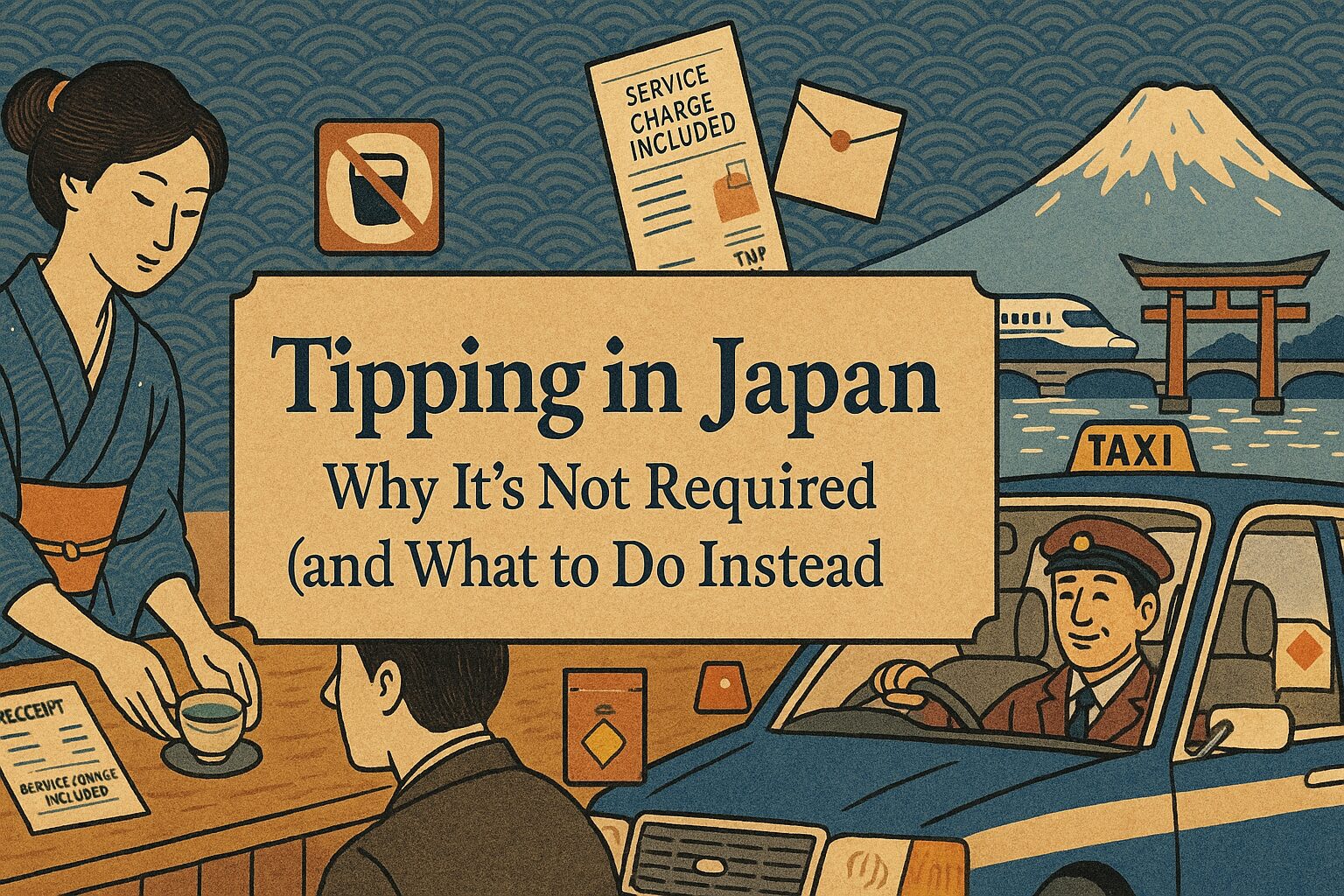Quick answer
In Japan, you don’t tip at restaurants, cafés, taxis, or hotels. A tip can even create confusion. If you really want to show appreciation, say arigatō gozaimasu (thank you), write a short note, leave a positive review—or, in rare cases, offer a small kokorozuke (cash in a small envelope) discreetly. Official guidance confirms tipping isn’t standard and many places already include a service charge on the bill. Japan Travel+1
Why Japan doesn’t use tips
- Service is part of the price. In mid- to upper-range restaurants and hotels, you’ll sometimes see a service charge listed on the receipt. That’s the gratuity—no extra is expected. Japan Travel
- The hospitality norm (omotenashi). Staff are trained to deliver considerate service to everyone, without expecting a separate reward. Japan’s national tourism information emphasizes that tipping is not common in everyday settings. Japan Travel
- Avoiding awkward moments. If you leave cash on the table, staff may run after you to return what they think is “forgotten change.” JNTO advises not to tip in typical scenarios. Japan Travel
What you’ll actually see on the ground
- Receipts rarely have a “tip” line. If a venue adds gratuity, it appears as a service charge on the bill. Otherwise, you just pay the total—no extra math. Japan Travel
- Taxi drivers don’t expect tips. Pay the metered fare; rounding up is unnecessary. Japan Travel
- Hotels and cafés are tip-free by default. Friendly service is the norm; no envelope needed. Japan Travel
2024–2025 update: A few tourist-heavy places have experimented with tip jars (e.g., a beef-cutlet chain), sparking debate in Japanese media. This is not a nationwide change; official advice still says tipping isn’t customary. Treat tip boxes as optional, not expected. Japan Today
Rare exceptions (how to handle them politely)
There are niche cases where a monetary thank-you may be accepted—always optional, never expected:
- Private guides or interpreters who are used to overseas practices. If you choose to give something, do it discreetly, ideally in a small envelope (pochibukuro), and offer it with both hands and a simple “Thank you.” Japan Travel
- High-end ryokan (traditional inns) sometimes recognize the old custom of kokorozuke. It’s far from universal today; many ryokan include service and may politely decline. Ask yourself: was there exceptional, personal assistance beyond normal duties? If yes—and you truly want to—an envelope with new bills offered at check-in or check-out is the traditional form. (Again: optional.) Japan Travel
How much? There’s no standard. If you insist, think modestly—symbolic, not percentage-based—and err on the side of not giving anything unless you’re sure it’s appropriate.
What to do instead of tipping (4 traveler-friendly options)
- Say it clearly: “Arigatō gozaimasu. That was wonderful.” A sincere comment matters.
- Leave a public review: Google Maps or booking sites help the staff more than cash that must be refused.
- Bring a tiny gift: If you already carry small snacks from home, you may offer one to a guide you’ve spent the day with. This is optional and situation-dependent.
- Respect the system: Follow house rules, arrive on time, and tidy your space—these gestures travel well.
Situations to avoid (common mistakes)
- Handing loose cash directly. If you must give money, put it in a small envelope; never slip bills into someone’s hand or leave coins on a table. Japan Travel
- Pushing a tip after it’s declined. A polite refusal means “no, thank you.” Smile and leave it there.
- Adding a “tip” when a service charge is already listed. You’d just be double-paying. Japan Travel
FAQs
Is there any time when tipping is expected in Japan?
No. Even in the edge cases above, a tip is never required. Official guidance frames tipping as uncommon, with rare, discreet exceptions. Japan Travel
Do I tip taxi drivers or hotel housekeeping?
No. Pay the fare or the room bill as invoiced. Housekeeping doesn’t expect envelopes on the pillow. Japan Travel
What is kokorozuke exactly?
It’s a traditional, discreet cash “thank-you,” historically offered in a small envelope in limited contexts. Modern travelers seldom need it; if you try, do it tactfully and accept a polite refusal. Japan Travel
I saw a tip jar—what should I do?
Up to you. The broader custom hasn’t changed—Japan doesn’t run on tips—but an occasional jar may appear in touristy spots. There’s no obligation to use it. Japan Today
Conclusion (with internal links)
In Japan, you don’t need to worry about tipping—just pay the total on the bill and that’s it. Thanks to the spirit of omotenashi, excellent service is provided to everyone without extra charges. If you want to show appreciation, use words, reviews, or (in rare cases) a small envelope with cash.
Enjoy your trip in Japan without the stress of tipping!
👉 Related guides you may find useful:
Tattoo Cover Seals for Onsen: What Works and How to Use Them
Onsen Etiquette in Japan: A Beginner’s Guide
Tattoo-Friendly Onsens: How to Find Them
Japan’s no-tipping norm is designed to be stress-free: pay what’s on the bill and enjoy excellent service without extra calculations. When gratitude moves you, use words, reviews, or an envelope in rare cases—and always keep it discreet.
Sources & further reading
- Japan National Tourism Organization (JNTO) — “Tipping in Japan.” Clear guidance: tipping is uncommon; if you do offer a gratuity, use an envelope; private guides may accept. Japan Travel
- JNTO — “Plan Your Trip.” Notes that tipping is not practiced and that restaurants commonly add a service charge to the bill. Japan Travel
- Japan Today (May 16, 2025). News on a restaurant chain adding tip boxes, reflecting debate but not a nationwide shift. Japan Today
- Japan Travel by NAVITIME — “Tipping in Japan.” Traveler-facing explainer reinforcing that tipping is not customary. ナビタイムジャパン旅行



コメント